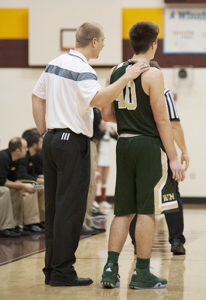Leaving your coaching mark on the team
If you’re like most coaches, you either dream of the chance to build your own program, have already had that opportunity, or are in the process of such a daunting, exciting task. Here are some ideas that can help you tackle the challenges of building a program that can make coaching all the more worthwhile.
Philosophy
 Building a program begins by establishing your philosophy. Successful coaches have a philosophy or a system that is the foundation for their basketball program. This doesn’t mean that your philosophy won’t vary from one season to the next. However, the changes shouldn’t go from one extreme to another.
Building a program begins by establishing your philosophy. Successful coaches have a philosophy or a system that is the foundation for their basketball program. This doesn’t mean that your philosophy won’t vary from one season to the next. However, the changes shouldn’t go from one extreme to another.
Plan
Organization is the key here. A coach must understand how they can use the individual talent on the team and the resources that are available to the program to their best advantage. A coach should communicate success to their players by having complete and structured practice plans, utilizing assistant coaches to help teach and by giving timely input in all decisions.
Discipline
It’s imperative that teams have guidelines, basic expectations that every player should shoulder. In our program, we have three such guidelines — go to class daily, be on time, and do no embarrass the program or the school.
Discipline also touches on work ethic. Do your players know that they must work harder than their opponent to win a championship? Are you willing to let a player slide by as long as they lead your team in scoring? Do the head coach and staff set the example of how important work ethic is to the program? Everyone must understand and embrace their roles.
Loyalty
A team that is united and confident that its teammates and coaches want what is best for one another cannot be held down for long. Encourage and promote your assistant coaches. Make them feel important to the welfare of your program, because they are. Show your players each day that you stand behind them and support them. Take an interest in their lives off of the court. This is what’s going to help coaches establish those valuable relationships that encourage players to fight for them on the court.
Leadership
Being an effective leader requires these essential traits:
- The ability to communicate and be honest with one another.
- Trust that is built upon honesty and prepares them for the inevitable crisis.
- Genuine concern for the players and support staff.
- Collective responsibility, which means finding the positive in failure. Successful programs win and lose together.
- Pride that is developed within the program. Play for the team, not the individual.
Help players gain these qualities while playing for you. Giving your team an emphasis of the day provides an excellent opportunity for a coach to start teaching vital leadership traits.
Positive attitude
Positive attitudes come about when focused dreams and shared passions reach attainable goals. Do you come to practice each afternoon excited? Do you brag about your kids and go out of your way to promote your program and the direction you are headed? A head coach cannot allow negative attitudes into their program. It’s like cancer, and those negative thoughts eat away at the fabric of the team. Make your players want to be a part of your program.
Team concept
A challenge for any coach is to develop a program where the team is greater than  any individual. This is done by talking about it as a team. Teach players the importance of what it means to be a team. Encourage the unselfish play, the hard work of the 12th man. Do not blame the failures of the team on one individual just as you should not credit one player for a win. You win and lose as a team. Remember, the players should play for the name on the front of their jerseys, not the name on the back.
any individual. This is done by talking about it as a team. Teach players the importance of what it means to be a team. Encourage the unselfish play, the hard work of the 12th man. Do not blame the failures of the team on one individual just as you should not credit one player for a win. You win and lose as a team. Remember, the players should play for the name on the front of their jerseys, not the name on the back.
Role model team
Now that we covered some of the key ingredients to building a successful program, let’s go over 10 tips to help make sure that your program is the envy of the conference.
1. Education first. Always emphasize the importance of the players’ education. Make players aware that their credentials in the classroom take them further and last longer than any success they might encounter on the court. Praise individual and team academic achievements to anyone and everyone who will listen, including to the other players on the team.
2. Promote the team. Promote your program to anyone who will listen. Talk to the local media about covering your games and writing features on the players. Speak at local clinics and service clubs.
3. Camps and clinics. Have players and coaches work camps in the school and throughout the community. Coaches and players that can get practice teaching the game become better coaches and players once the season starts.
4. Look the part. Dress up your locker room, uniforms and warm-ups whenever possible. Teams that look good play with confidence.
5. Fundraise. Develop fundraisers that add revenue to your program and help address point No. 4. Free-throw-shooting fundraisers, for example, are a great way to generate cash while improving skills.
6. Promotions. Develop promotions that make your games the place to be on game night. These can be a significant driver of attendance, especially for students.
7. Involve other teams. Get the feeder schools involved in your program. Invite coaches to work camps, speak at clinics and attend practices. This aids the program in creating excitement among younger athletes about one day being part of the varsity team.
8. Include faculty. Make the faculty a part of your program. Remember, academics are why your players are in school, and a faculty that is involved in your program is a faculty that wants to help make your program the best. They might even be more willing to volunteer and help out during fundraisers or game-day events.
9. Volunteer. Visit local hospitals and develop community programs whenever possible. We all need to be appreciative of what we have been blessed with and give back to those who haven’t been as fortunate.
10. Love the job. Love what you do, because it’s that passion that excites others in the program. Don’t let your ambition take away your love of the game.









